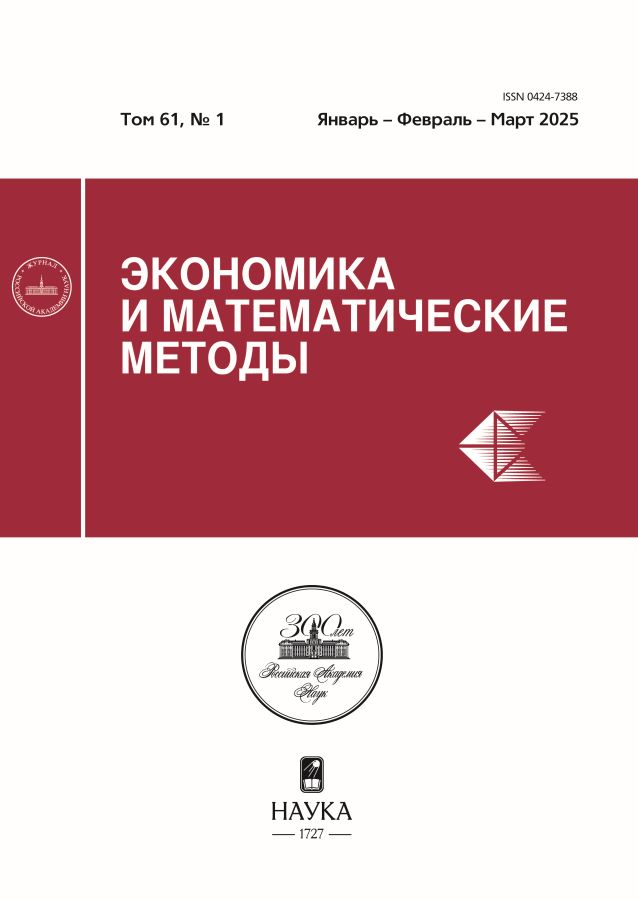Model of R&D timing at an enterprise under uncertainty
- 作者: Arkin V.I.1, Slastnikov A.D.1
-
隶属关系:
- Central Economics and Mathematics Institute, Russian Academy of Sciences (CEMI RAS)
- 期: 卷 61, 编号 1 (2025)
- 页面: 84-94
- 栏目: Проблемы предприятий
- URL: https://rjmseer.com/0424-7388/article/view/682163
- DOI: https://doi.org/10.31857/S0424738825010085
- ID: 682163
如何引用文章
详细
The object of the study is an enterprise (in real sector) which has a possibility to carry out structural changes through the implementation of some innovative project. At some time the enterprise decides to carry R&D for the implementation of an innovative project. During R&D stage the company receives subsidies from the state, and expenses are deducted with the certain increasing coefficient. After the R&D stage, an innovative project starts implementation only with some probability. The enterprise operates under uncertainty, its profits flow is modeled by a stochastic process, and after the project implementation it changes to another stochastic process. We consider the problem of choosing such a moment for R&D start when the expected net discounted income of the enterprise would be maximal. It is proved that the optimal time to start R&D for the implementation of an innovative project coincides with the first time when the current profit of an enterprise exceeds certain threshold. We derive the explicit formula for the dependence of this threshold on the parameters in the model: the average growth rate and volatility of enterprise’s profits before and after the project implementation; the tax burden; the volume of subsidies provided; the amount of investments necessary for the project implementation; duration of the R&D stage; the probability of the project implementation; discount rates. The conditions under which the optimal time to start R&D will be finite (with a positive probability) are investigated. We study the dependence of this optimal time on the tax burden, the amount of subsidies, R&D costs and the probability of project implementation.
全文:
作者简介
V. Arkin
Central Economics and Mathematics Institute, Russian Academy of Sciences (CEMI RAS)
编辑信件的主要联系方式.
Email: varkin@mail.ru
俄罗斯联邦, Moscow
A. Slastnikov
Central Economics and Mathematics Institute, Russian Academy of Sciences (CEMI RAS)
Email: aslast@mail.ru
俄罗斯联邦, Moscow
参考
- Андерсон Дж. (2004). О приватизации государственной собственности // Вопросы экономики. № 12. С. 54–69. [Anderson J. (2004). On privatizing state property. Voprosy Ekonomiki, 12, 54–69 (in Russian).]
- Аркин В. И. (2014). Пороговые стратегии в задачах оптимальной остановки одномерных диффузионных процессов // Теория вероятностей и ее применения. Т. 59. Вып. 2. С. 365–374. [Arkin V. I. (2014). Threshold strategies in optimal stopping problem for one-dimensional diffusion processes. Theory of Probability and Its Applications, 59, 2, 365–374 (in Russian).]
- Аркин В. И., Сластников А. Д. (2020). Математическая модель частичной приватизации предприятия // Экономика и математические методы. Т. 56. № 3. С. 91–102. [Arkin V. I., Slastnikov A. D. (2020). Mathematical model of the firm’s partial privatization. Economics and Mathematical Methods, 56, 3, 91–102 (in Russian).]
- Воронина Т. В., Гамбарян Р. Г. (2023). Влияние инвестиций в НИОКР на объем высокотехнологичного экспорта // Финансовые исследования. № 1 (78). С. 132–142. [Voronina T. V., Ghambaryan R. G. (2023). The impact of R&D investments on the volume of high-tech exports. Financial Research, 1 (78), 132–142 (in Russian).]
- Клавдиенко В. П. (2021). Государственная поддержка НИОКР и инноваций в бизнес-секторе стран ЕС // Инновации. № 04 (270). С. 63–68. [Klavdienko V. P. (2021). State support of R&D and innovation in the business sector of the European Union`s countries. Innovations, 04 (270), 63–68 (in Russian).]
- Кондратенко А. Н. (2022). Вопросы методологии сопровождения, реализации и информационного обеспечения НИОКР, технологических работ и инвестиционных проектов // Вестник «НПО “Техномаш”». № 1. С. 28–42. [Kondratenko A. N. (2022). Issues of support methodology, implementation and information support of research and development technological work and investment projects. NPO “Technomac Vestnik”, 1, 28–42 (in Russian).]
- Леонтьева В. В. (2020). Влияние неопределенности на инвестиции в НИОКР российских компаний. Магистерская диссертация. НИУ ВШЭ. Пермь. Режим доступа: https://nauchkor.ru/pubs/vliyanie-neopredelennosti-na-investitsii-v-niokr-rossiyskih-kompaniy-5efa1fe3cd3d3e00013cd32a [Leonteva V. V. (2020). The impact of uncertainty on investment of Russian companies into R&D. Master Thesis. HSE University, Perm. Available at: https://nauchkor.ru/pubs/vliyanie-neopredelennosti-na-investitsii-v-niokr-rossiyskih-kompaniy-5efa1fe3cd3d3e00013cd32a (in Russian).]
- Логинова Т. А. (2022). Налоговое стимулирование расходов предприятий на НИОКР: особенности и проблемы регулирования // Правоприменение. Т. 6. № 1. С. 111–123. [Loginova T. A. (2022). Tax regulation of enterprise R&D expenditures: Special aspects and problems of regulation. Law Enforcement Review, 6, 1, 111–123 (in Russian).]
- Ширяев А. Н. (1998). Основы стохастической финансовой математики. Т. 2. Теория. М.: ФАЗИС. 544 с. [Shiryaev A. N. (1999). Essentials of stochastic finance. Facts, models, theory. Singapore: World Scientific. First published in Russian in 1998 as “Fundamentals of Stochastic financial Mathematics”, Moscow: FAZIS. 544 p.]
- Abel A. B. (1983). Optimal investment under uncertainty. The American Economic Review, 73 (1), 228–233.
- Abel A. B. (1984). The effects of uncertainty on investment and the expected long-run capital stock. Journal of Economic Dynamics and Control, 7, 1, 39–53.
- Aboody D., Lev B. (2000). Information asymmetry, R&D, and insider gains. The Journal of Finance, 55, 6, 2747–2766.
- Agliardi E. (2001). Taxation and investment decisions: A real options approach. Australian Economic Papers, 40, 1, 44–55.
- Alvarez L. H.R., Stenbacka R. (2001). Adoption of uncertain multi-stage technology projects: A real options approach. Journal of Mathematical Economics, 35, 1, 71–97.
- Alvarez L. H.R., Stenbacka R. (2004). Optimal risk adoption: A real options approach. Economic Theory, 23, 1, 123–147.
- Baker S. R., Bloom N., Davis S. J. (2016). Measuring economic policy uncertainty. The Quarterly Journal of Economics, 131, 4, 1593–1636.
- Dixit A. K., Pindyck R. S. (1994). Investment under uncertainty. Princeton: Princeton University Press.
- Hartman R. (1972). The effects of price and cost uncertainty on investment. Journal of Economic Theory, 5, 258–266.
补充文件










